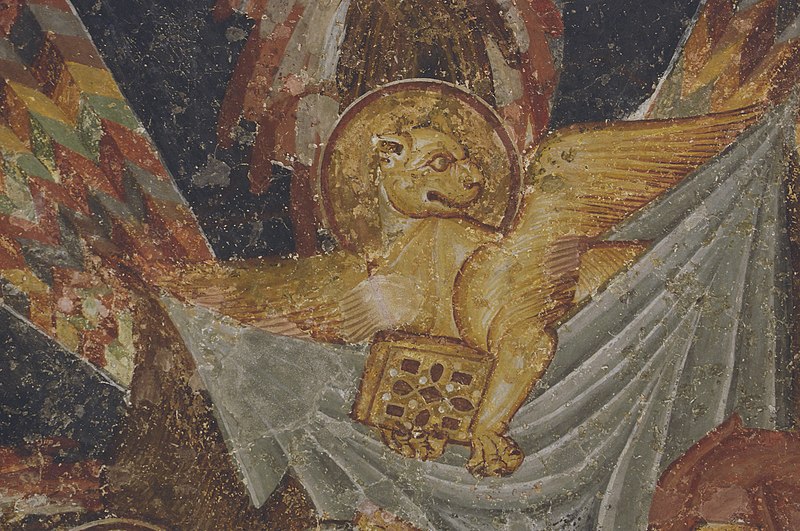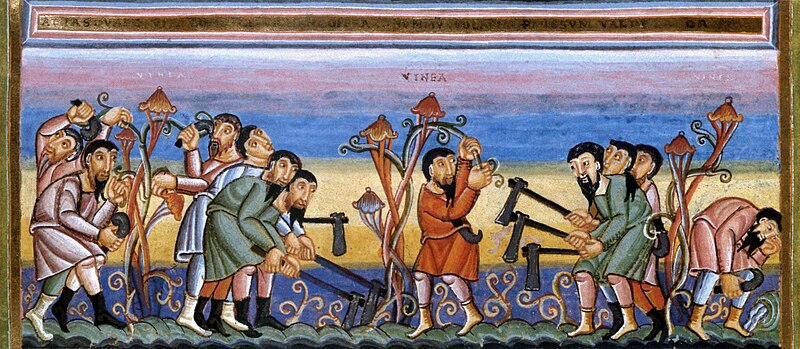
Some thoughts about the texts for the fourth Sunday in Easter. For earlier devotional writings on these texts, follow this link for Easter 4 B.
Good Shepherd Sunday is the middle Sunday of the seven Sundays of the Easter Season. It is the pivot point between looking back towards Easter Sunday and turning forward toward Pentecost. The texts before this Sunday are resurrection appearances. After this, we read from John’s Gospel of the abiding presence of Christ Jesus in the community of his followers, moving us towards the outward mission empowered by the Spirit on Pentecost. Recognizing this helps us resist the urge to hear this Good Shepherd language not just in personal terms (Jesus and me or Jesus and us) but that the crucified and risen one is the Good Shepherd of the world.
Shepherd as political language
The language of shepherd is used throughout the Hebrew Scriptures with reference either to God (Psalm 80:1; Isaiah 40:11; Jeremiah 31:10) or to the king as God’s “son”, God’s representative (2 Samuel 5:1-2). By extension it refers to the Jerusalem leadership (Jeremiah 10:21; Jeremiah 23:1-6; Ezekiel 34), and concerns not only the leadership of the nation but the world, for it is also used of Cyrus! (Isaiah 44:28)
Sunday’s texts exist in the world of political machinations and the struggle for position, influence, and power. The Biblical record is rife with political conflict even before we get to the struggle between God and Pharaoh over slaveholding. It records in detail the rise and fall of Saul, the struggle for the succession to King David, the political struggle leading to the breakup of the Davidic kingdom, the multiple bitter revolutions in the northern kingdom of Israel, the involvement of the prophets in the political struggles, and the conflicted political history of the southern kingdom of Judah leading to its destruction. The conflict between Jesus and the governing elite in Jerusalem shows up quickly in the Gospels and ends with Jesus’ execution. That conflict continues in the book of Acts. Leadership, shepherding, of the nation and the world is a very large part of the biblical witness. Psalm 23 is powerful at a graveside, but it is written amidst palace intrigue and dares to claim that the king himself has a shepherd.
It is worth saying that these texts are about shepherds, not about the sheep. Too often we get sidetracked talking about ourselves as sheep.
Also worth noting, in most of the world shepherds drive their flocks from behind; in Palestine, shepherds walk in front and their sheep follow. Again, though, this is about shepherds not the sheep. Shepherds lead the way. They go ahead of us. They don’t tell us what to do, they do it.
Psalm 23 (The Lord is my shepherd)
As deeply personal as is Psalm 23, as much as it embraces us in and around death or in times of trial, we still need to hear these words in the context of the struggles for power in the royal court. (“You set a table before me in the presence of my enemies”!) David makes a remarkable claim there is a shepherd above him, a shepherd who leads him, a shepherd he follows.
This is what makes David a faithful king, despite his failings. When confronted by the prophet Nathan about the murder of Uriah and the taking of his wife, Bathsheba, David repents. It didn’t go so well for other prophets. Elijah has to flee, Jeremiah is thrown in prison, John the Baptizer loses his head, and Jesus gets tortured and publicly executed. David, however, listened. And admitted the truth. And turned back toward faithfulness.
Acts 4:5-12 (Peter’s defense before the Sanhedrin)
The selection of apostolic speeches used in the Easter season is somewhat troubling because the assigned readings leave off the context that gives rise to the preaching – context that is important. It would make more sense this Sunday to from 4:1 and at least to 13.
The Sanhedrin is the governing body charged not only with religious leadership but civil order. It is their responsibility to maintain the peace. Failing to do that would result in Roman action to appoint new leaders, costing these families not only their position, but their wealth and privilege. This is why it was necessary in their eyes to silence Jesus, and to demonstrate through the shame and degradation of crucifixion by Rome that he was nothing but a powerless insurrectionist resisting the rightful rulers of the nation.
The claim by Peter and John that God has raised this Jesus “whom you crucified” means that God has not only revoked the sentence imposed by the Jerusalem leadership that Jesus was false but abrogates the Sanhedrin’s claim to authority. To proclaim the resurrection is to indict the Jerusalem leadership as being against God. It declares them false shepherds (“hired hands”, to use the Gospel’s phrase – hired by Rome – who do not care for the sheep). This is why the preaching of the apostles must be silenced.
Words in the translation like “arrest” suggest to our ears some judicial process. Peter and John were snatched, grabbed, or seized (literally, hands thrown upon them). Jail, too, sounds like there was some juridical process; they were more literally something like “under guard”.
Despite their arrest, the number of believers (those who trusted the message that Jesus was raised/vindicated by God) grew to 5,000. This raises the stakes for the Jerusalem leadership. The word is spreading, and they have to get it under control. They must silence this testimony – but the message can’t be silenced!
When the text says that “There is salvation in no one else …”. It’s very important to locate that sentence not in the modern worldview that death leads either to heaven or hell, and that having the right ticket matters, but in the confession that Jesus is the one who brings “the kingdom of God”, God’s new creation, God’s reign of light and life, justice and mercy. No one else is bringing that healing/wholeness/governance of God’s spirit over all creation – certainly not the Sadducees and pharisees or any others aligned with Rome or leading an insurrection against Rome.
Luke is writing after the rebellion and war with Rome. All those who claimed or were acclaimed to be God’s Messiah did not bring life, but the brutal and devastating destruction of Jerusalem. There was no healing brought by these shepherds. No healing brought by the Romans. No healing brought by anyone other than this Jesus who would not and did not take revenge against those who crucified him.
1 John 3:16-24 (Let us love, not in word or speech, but in truth and action)
Our second reading continues through 1 John. There’s too much to talk about (since everything in John touches on everything else in John) except to note that this letter arises after the Johannine community has divided and the author is writing about those who have left the community (leaving it in need) to pursue a more personal spirituality. To “love” is to treat others as members of one’s own household. It is the fulfilling of obligations to care for, provide and protect. “Hate” means regarding others as strangers to whom one has no obligation. It is more akin to the word apathy. Those who have left the community have broken their obligation to care and provide, thus they “hate”.
John 10:11-18 (The good shepherd lays down his life for the sheep)
We have the second section of the Good Shepherd discourse in year B, but it’s hard to keep the elements separate. The text has previously talked about the thief who “comes only to steal and kill and destroy,” whereas Jesus, the good shepherd, comes to give, make alive, and create. (And it should be noted that to have life abundantly doesn’t mean wealth, power and success! It is to possess the mercy, truth, joy, love that are imperishable.)
This leads to the language about the Good Shepherd who doesn’t take life but lays his life down. The shepherds (political leaders) take. They take people’s grain and livelihood. They take their sons and daughters. Read again 1 Samuel 8 about the nature of kings! (I wrote recently about this here ). The Jerusalem elite allied with the empire are “hired hands,” owned by the Romans.
“I have other sheep” keeps us aware and focused on those who are not yet part of our faith communities. “They will listen to my voice.” They will attend to the things Jesus says, they will obey his command to love.
“For this reason the Father loves me, because I lay down my life in order to take it up again.” God doesn’t feel affection for Jesus because he is willing to go to the cross, God shows faithfulness to Jesus, is bound to him as one family member to another, just as Jesus is bound to the Father. It is because of this bond, this sharing of the divine will and way, that Jesus lays down his life. He loves as God loves. He is faithful as God is faithful.
In v. 17: “I lay down my life in order to take it up again.” The key word is λαμβάνω. What if it should be translated “so that I may receive it again”? And in v. 18: “I have power to take it up again.” What if it should be translated as “I have authority to receive it again”?
In a world of many rulers who plunder the sheep, we are met by the world’s true and good shepherd, who embodies the divine mercy and faithfulness and brings the healing of the world. This proclamation that Jesus is risen confronts and challenges the present rulers and order of our world.
Gracious Heavenly Father,
Christ Jesus the Good Shepherd laid down his life for the world
that he might gather into one flock all the nations of the earth.
Be at work within us
that we might hear and respond to his voice,
and follow him in lives of service and love.
+ + +
Photo: https://commons.wikimedia.org/wiki/File:%22The_good_Shepherd%22_mosaic_-_Mausoleum_of_Galla_Placidia.jpg; Petar Milošević, CC BY-SA 4.0 <https://creativecommons.org/licenses/by-sa/4.0>, via Wikimedia Commons.
New Revised Standard Version Bible, copyright © 1989 National Council of the Churches of Christ in the United States of America. Used by permission. All rights reserved worldwide. http://nrsvbibles.org
© David K Bonde, 2024, All rights reserved.




 Watching for the Morning of February 14, 2021
Watching for the Morning of February 14, 2021 Watching for the Morning of January 17, 2021
Watching for the Morning of January 17, 2021


